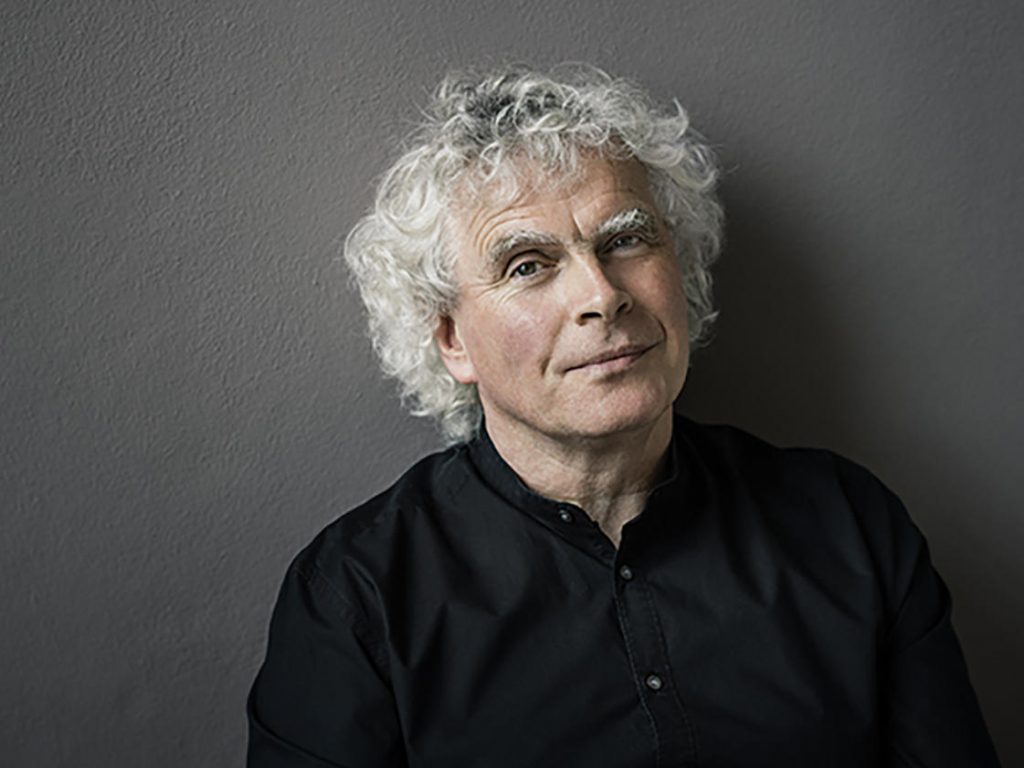Simon Rattle returns to Boston for good cause, cathartic Brahms with Mistral Music

The Brookline-based chamber ensemble Mistral Music pulled out all the stops for “Hope & Harmony,” its third anti-cancer benefit concert (and first since 2010) at Jordan Hall Sunday night.
Conceived by Mistral flutist and artistic director Julie Scolnik, herself a breast cancer survivor, these programs extol the centrality of music and the support of Scolnik’s colleagues in aiding her in her bout with the disease, while also helping to raise funds for those currently battling cancer.
Sunday’s gala focused on the plight of underserved women fighting breast cancer in and around Boston, highlighting three vital organizations: the Boston Health Care for the Homeless Program, Boston Breast Cancer Equity Coalition, and Greater Lawrence Family Health Center. Nearly $100,000 had been raised by this event as of the concert time.
The event itself, which included introductory remarks from On Point’s Meghna Chakrabarti and a moving testimonial from Scolnik, boasted an all-star pickup orchestra that drew from the rosters of Mistral, the Boston Symphony Orchestra, Boston Philharmonic Orchestra, Lydian String Quartet, Philadelphia Orchestra, and Metropolitan Opera Orchestra, among others.
Presiding over the ensemble was Sir Simon Rattle, former music director of the Berlin Philharmonic Orchestra and presently holding the same title with the London Symphony Orchestra.
Rattle has not been a regular guest in Boston since the 1990s, but his rapport with this ad hoc band was apparent from the downbeat of the night’s opener, Mozart’s Overture to The Marriage of Figaro.
Sunday’s was a spry, spirited performance, yes. But also a carefully balanced and winningly shaped one—woodwind lines singing pertly and unison string figurations speaking with biting evenness of attack.
The slow movement from Beethoven’s Ninth Symphony followed, and it provided an alluring contrast to the unbridled ebullience of the Mozart.
Here, Rattle drew an account of fresh, spontaneous lyricism from the orchestral strings: the opening theme was played with touching nobility by the violins (especially on its hushed, central iteration), while the concluding, florid variations were beautifully shaped. The tonal blend between woodwinds and brasses, throughout, was warm and rich, while the winds’ execution of the secondary theme before the last variations was pristinely balanced.
This was a reading of the Beethoven, too, that was structurally focused and motivically cogent, qualities that also defined the night’s finale, Brahms’s Symphony no. 1.
For all its moments of bliss and splendor, Brahms’s 1876 score travels to some very dark places. Emotional turbulence is never far beneath its surface, though, ultimately, radiant light shines supreme.
Sunday’s interpretation was taut and driven. A portentous account of the first-movement’s opening led to a tense and surprisingly colorful realization of its brisk main section, Rattle’s close attention to dynamic balances providing room for all orchestral voices (including the contrabassoon) to speak through Brahms’s sometimes-thick orchestrations.
The second movement, headlined by mellifluous solos from principal oboe John Ferrillo and concertmaster Juliette Kang, sang majestically. Tempos in the intermezzo-like third were at the very least urgent – sometimes bordering on frantic – but the music’s serenely lyrical lines still managed to float.
In the finale, Rattle’s seating of the violin sections across from one another provided a welcome depth of texture in the long introduction. Burnished horn playing and Scolnik’s silvery flute solos then led to a viscerally exciting account of the concluding Allegro non troppo, ma con brio (which, for the record, Rattle took plenty “troppo” and “con brio”).
Still, nothing felt rushed or unduly pushed: this was a Brahms First of impellent power and purpose, not to mention expressive catharsis. When the final chorale and ecstatic coda rolled around, one could hardly help but be swept up in the moment – especially as the final trombone arpeggio sounded with such resplendent clarity.
Mistral Music’s season continues with “The Baroque Big Band” featuring music by Bach 4 p.m. December 7 at Andover’s West Parish Church and 5 p.m. December 8 at Brookline’s Congregation Kehillath Israel. www.MistralMusic.org
Posted in Performances